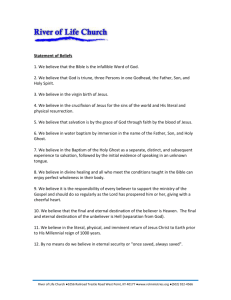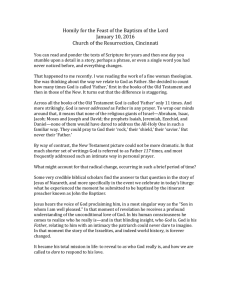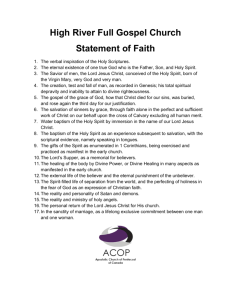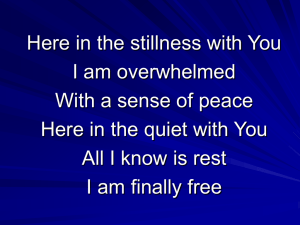Commentary
advertisement
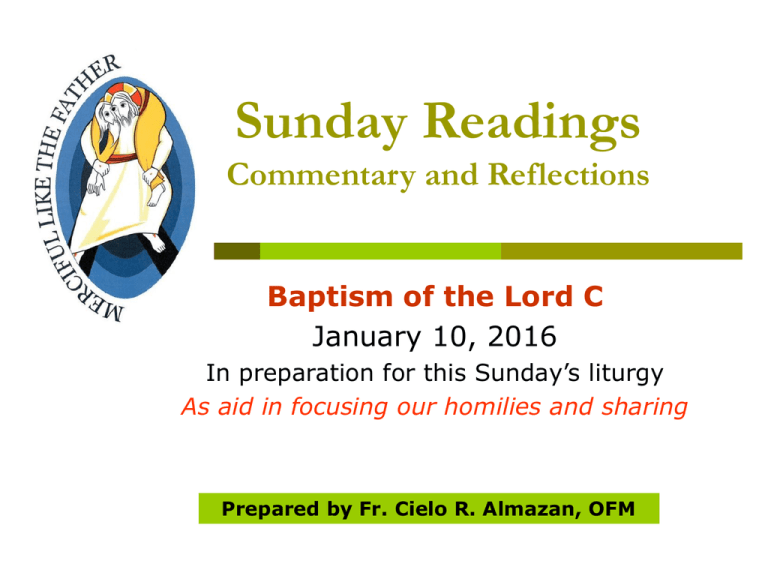
Sunday Readings Commentary and Reflections Baptism of the Lord C January 10, 2016 In preparation for this Sunday’s liturgy As aid in focusing our homilies and sharing Prepared by Fr. Cielo R. Almazan, OFM The focus is on the mission of God’s Son. 1st reading: Isaiah 42,1-4.6-7 Presenting his servant and his mission 1 Here is my servant whom I uphold, my chosen one with whom I am pleased, upon whom I have put my spirit; he shall bring forth justice to the nations, 2 not crying out, not shouting, not making his voice heard in the street. 3 A bruised reed he shall not break, and a smoldering wick he shall not quench, 4 until he establishes justice on the earth; the coastlands will wait for his teaching. God’s direct address to his servant 6 I, the LORD, have called you for the victory of justice, I have grasped you by the hand; I formed you, and set you as a covenant of the people, a light for the nations, to open the eyes of the blind, to bring out prisoners from confinement, and from the dungeon, those who live in darkness. 1st reading: Isaiah 42,1-4.6-7 Commentary 1 Here is my servant whom In v.6, God tenderly speaks I uphold, my chosen one about his servant’s vocation. with whom I am pleased, He will be victorious in his fight upon whom I have put my for justice. (successful, spirit; he shall bring forth effective) justice to the nations, 2 not crying out, not shouting, God has shown himself to be a not making his voice heard kind father to his servant/son. in the street. 3 A bruised “He holds him by the hand” reed he shall not break, evokes the tender guidance of and a smoldering wick he the Father to his son. shall not quench, 4 until he “I formed you” may no longer establishes justice on the refer to his being formed in his earth; the coastlands will mother’s womb, but to his wait for his teaching. education, formation as his servant grows up. (formed) 1st reading: Isaiah 42,1-4.6-7 6 I, the LORD, have called you for the victory of justice, I have grasped you by the hand; I formed you, and set you as a covenant of the people, a light for the nations, to open the eyes of the blind, to bring out prisoners from confinement, and from the dungeon, those who live in darkness. Vv.6-7 also indicate the big mission of his servant: To be a covenant of the people (source of bonding) To be a light to the nations (guide) To open the eyes of the blind (gives understanding) To bring out prisoners from the prison cell (liberator) To bring those in darkness out of dungeons (redeemer, ransom-er). Reflections on the 1st reading Like God’s servant in Isaiah, we are also called to establish justice on the earth. We have been called to serve God’s interests by virtue of our baptism. It is a contradiction in terms if we, Christians, cause injustice, or, if we do not work for justice. Now we do not talk of justice due only to us, individuals (human rights), but also due to society (social justice) and to the environment (environmental justice). We can’t establish justice if we are isolated from one another. (need for networking, Laudato Si) Resp. Psalm 29:1-2, 3-4, 3, 9-10 (11b) The Lord will bless his people with peace. 1 Give to the LORD, you sons of God, give to the LORD glory and praise, 2 Give to the LORD the glory due his name; adore the LORD in holy attire. 3 The voice of the LORD is over the waters, the LORD, over vast waters. 4 The voice of the LORD is mighty; the voice of the LORD is majestic. 9 The God of glory thunders, and in his temple all say, “Glory!” 10 The LORD is enthroned above the flood; the LORD is enthroned as king forever. Resp. Psalm 29:1-2, 3-4, 3, 9-10 (11b) The Lord will bless his people with peace. 1 Give to the LORD, you sons of God, give to the LORD glory and praise, 2 Give to the LORD the glory due his name; adore the LORD in holy attire. 3 The voice of the LORD is over the waters, the LORD, over vast waters. 4 The voice of the LORD is mighty; the voice of the LORD is majestic. 9 The God of glory thunders, and in his temple all say, “Glory!” 10 The LORD is enthroned above the flood; the LORD is enthroned as king forever. Commentary The responsorial psalm speaks of the good effect of God’s coming (blessing). Vv.1-2 exhort the people to give God glory and praise. In vv.3-4, God’s voice is amplified. It can be heard everywhere. It can’t be ignored. In vv.9-10, God as king is enthroned above nature. God is forever king. Reflections on the Psalm It is a Christian imperative to praise and glorify God. Christians must recognize that God is king. He deserves all our praise and thanksgiving. We, as a community of believers, can properly praise God in our liturgy, in our churches. God is best praised when we do it in one voice. In relation to the first reading, we praise God best when we are transformed. The focus is on the activities of Jesus. 2nd reading: Acts 10,34-38 34 Then Peter proceeded to speak and said, "In truth, I see that God shows no partiality. 35 Rather, in every nation whoever fears him and acts uprightly is acceptable to him. 36 You know the word (that) he sent to the Israelites as he proclaimed peace through Jesus Christ, who is Lord of all, 37 what has happened all over Judea, beginning in Galilee after the baptism that John preached, 38 how God anointed Jesus of Nazareth with the holy Spirit and power. He went about doing good and healing all those oppressed by the devil, for God was with him. 2nd reading: Acts 10,34-38 Commentary God himself Intro: Peter, the apostle, 34 Peter proceeded to preaches in the house of speak to those gathered Cornelius, a Gentile. He in the house of explains why he is there. Cornelius, saying, "In (in previous verses) truth, I see that God shows no partiality. 35 In v.34, Peter affirms Rather, in every nation that whoever fears him and God has no partiality. acts uprightly is God does not discriminate against the Gentiles. acceptable to him. God accepts all individuals who fear him and are righteous. V.35 2nd reading: Acts 10,34-38 God through Jesus Christ V.37 points to the events 36 You know the word after the baptism of Jesus (that) he sent to the by John. Israelites as he proclaimed V.38 points also to the peace through Jesus Christ, who is Lord of all, event when God anoints 37 what has happened all Jesus with the Holy Spirit over Judea, beginning in and power. Galilee after the baptism This is the baptism of Jesus. that John preached, 38 how God anointed Jesus of V.38b indicates the mission Nazareth with the holy of Jesus after his baptism. Spirit and power. He went Doing good about doing good and Healing those oppressed by healing all those the devil (exorcism) oppressed by the devil, for God was with him. Reflections on the 2nd reading As God loves everyone, so must we. Jesus’ ministry consists in healing, in casting out demons and in doing good works. In our baptism, we are called to share in the mission of Jesus (preaching, healing, exorcising demons of our society, and forgiving). Let us not squander our vocation. Let us take responsibility… Let us not become instruments of the devil that promotes complacency and negligence. Let us live as committed / engaged Christians. Wake up laity. Don’t be clericalized, according to Pope Francis. Your mission is in the secular world. Gospel reading: Luke 3,15-16.21-22 15 The people were filled with expectation, and all were asking in their hearts whether John might be the Messiah. 16 John answered them all, saying, "I am baptizing you with water, but one mightier than I is coming. I am not worthy to loosen the thongs of his sandals. He will baptize you with the holy Spirit and fire. 21 After all the people had been baptized and Jesus also had been baptized and was praying, heaven was opened 22 and the holy Spirit descended upon him in bodily form like a dove. And a voice came from heaven, "You are my beloved Son; with you I am well pleased." The focus is on the baptism of Jesus. A simple outline! Gospel reading: Luke 3,15-16.21-22 John, not the Messiah 15 The people were filled with expectation, and all were asking in their hearts whether John might be the Messiah. 16 John answered them all, saying, "I am baptizing you with water, but one mightier than I is coming. I am not worthy to loosen the thongs of his sandals. He will baptize you with the holy Spirit and fire. Jesus, the Messiah 21 After all the people had been baptized and Jesus also had been baptized and was praying, heaven was opened 22 and the holy Spirit descended upon him in bodily form like a dove. And a voice came from heaven, "You are my beloved Son; with you I am well pleased." Gospel reading: Luke 3,15-16.21-22 John, not the Messiah 15 The people were filled with expectation, and all were asking in their hearts whether John might be the Messiah. 16 John answered them all, saying, "I am baptizing you with water, but one mightier than I is coming. I am not worthy to loosen the thongs of his sandals. He will baptize you with the holy Spirit and fire. Commentary V.15 indicates that the people regard John so highly, so much so that they think he is the Messiah. In v.16, John clarifies he is not the Messiah. The Messiah is mightier than he is. The Messiah will baptize them with holy Spirit and fire, not just water. Gospel reading: Luke 3,15-16.21-22 Jesus, the Messiah 21 After all the people had been baptized and Jesus also had been baptized and was praying, heaven was opened 22 and the holy Spirit descended upon him in bodily form like a dove. And a voice came from heaven, "You are my beloved Son; with you I am well pleased." V.21 indicates that all the people have been baptized, including Jesus. V.21 seems to indicate that John’s work is over. V.21 indicates that Jesus was praying. “Heaven opened” means salvation has dawned. Now, we can go to heaven. Now, the Holy Spirit can descend upon Jesus, like a dove. V.22 includes a voice from the Father. The Father affirms the divine sonship of Jesus. Reflections on the gospel reading In our baptism, God declares that we are his children. Baptism is not just a matter of God cleansing us from our sins, or, a sign of our conversion. It is, first of all, a process in which we become God’s children. When we read the story further (temptation and sermon in Nazareth), we are led to think that our baptism is a step towards combating against temptations (the desires of the devil) and doing our mission (the will of God). Our baptism is the beginning of taking responsibilities (mission) as God’s children (saying no always to temptations). Tying the 3 readings and the Psalms The first reading informs us the mission of God’s servant. The psalm speaks of God coming to bless us. It also speaks of God enthroned above the waters (The imagery reminds us of floodwaters or waters of baptism). The second reading speaks of Jesus’ mission after his baptism. The gospel reading speaks of the baptism of Jesus. How to develop your homily / sharing We, preachers, must develop the meaning of baptism. There are two baptisms to explain: That of Jesus. Our baptism. The gospel reading makes clear to us, in the story of baptism, that Jesus is God’s son. The Father in heaven acknowledges him to be his beloved son, in whom he is well pleased. The Holy Spirit (in the form of a dove) is with him. Jesus is mightier than John the Baptist. Jesus is the Messiah. We should make the proper conclusions when we learn something about the titles of Jesus. He is not just an ordinary human being. He comes from God; he has an extraordinary mission. Therefore, we should take his words seriously. We know later on that he is here to proclaim and establish God’s reign. Jesus’ baptism is the beginning of his fight against the devil (in temptations) and his mission to proclaim (to spread out) the kingdom of God. What is the meaning of our baptism? According to our catechism, it takes away the original sin. It restores us to our original dignity. It is also the beginning of our mission. As we do our mission, we are also called to defeat the evil one. The evil one entices us to violate God’s commands, to renege our childrenhood. It puts us into the test (inilalagay tayo sa alanganin, para mapahamak tayo). It makes us doubt our identity as God’s children. Our baptism is the beginning of our mission. Taking the cue from the first reading, our mission as God’s servants is to bring about peace and justice in the land. We should not complain if people are hostile to us. To engage in mission, we must be willing to suffer. It is about to bring healing to the wounded and remedy to the deprivations. It is a mission of liberation from all physical and moral evil. In the second reading, we are told in a summary form how Jesus went about his mission after his baptism. Jesus went about doing good and liberating people from evil that oppresses them. He was able to do these things because God was with him and was full of power. We must also believe that God is with us, powered up by his Word and Spirit. Certainly, in our parishes, we need a lot of explaining to the people about the meaning of baptism. Many Christians are baptized, but they don’t know its implications in their lives. They are “sacramentalized” (baptized), but not evangelized, not engaged in evangelization (mission). The meaning of their baptism is not fully understood. Hence, we have a bunch of nominal or pious Christians, but not committed, or have sense of mission. Catechism or instruction both for the adults and for the youth, is a part of the pastor’s priority. Catechism is explaining who God is to us and his mission. Well-catechized people and families are more prepared to accept Jesus in their lives and in the Eucharist. They practice their faith according to the teachings of the Church, without being fanatical. They understand better their faith and theology and act accordingly for the transformation of the world. The eucharist is the sacrament received by those who are faithful to their baptismal vows. The eucharist is not for those who shun mission. True understanding of baptism must necessarily lead us to the reception of the eucharist. The eucharist is the strength of those who share in the mission of Christ. Our Context of Sin and Grace No catechism Well-catechized No budget for catechists Exaggerated baptismal celebrations without knowing its meaning Pastors and sisters who are concerned with catechetics Faithful to baptismal vows Christians with a sense of mission No follow up after 1st communion No ongoing formation Uncompromising with evil Disease due to sinful lifestyle Regular in receiving Holy Communion Suggested Songs Go Tell Everyone Sumasampalataya Ako https://www.youtube.com/watch?v=aa0Mzl9d dGw by Fr. Marcelo http://www.youtube.com/watch?v=TGupNKiYt2s http://www.youtube.com/watch?v=TO_O7BLczhs Isang Pananampalataya by Hontiveros



